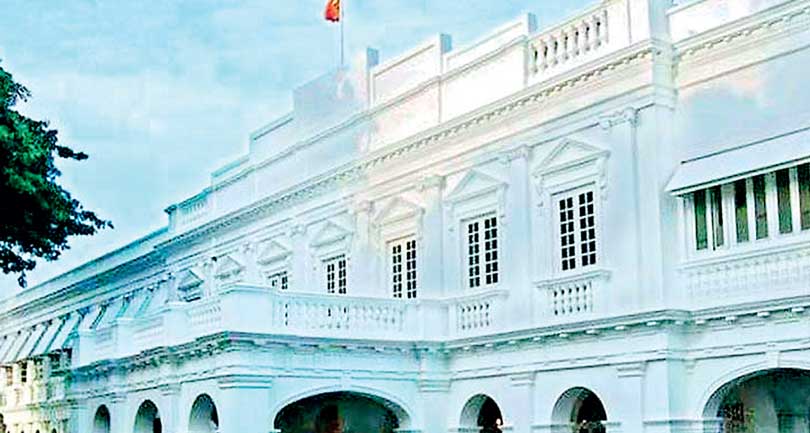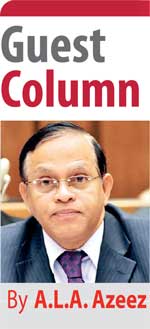Monday Feb 16, 2026
Monday Feb 16, 2026
Tuesday, 11 February 2025 00:03 - - {{hitsCtrl.values.hits}}

The success of diplomacy and the effectiveness of the Foreign Service rely on its willingness and ability to consult, negotiate, and contribute to consensus-building
It is not too late for the Foreign Service to subject itself to scrutiny, find where things have gone wrong, and seek to enhance its capabilities and professionalism through reforming itself. It is essential to keep in mind what impels such a process sooner rather than later. The harsh reality is that the members of the SLFS have often acted out of personal self-interest, unlike many of the other all-island services
 In an interesting development, the Sri Lanka Foreign Service Association (SLFSA) has issued a media release advocating for the depoliticisation of the diplomatic service and the recognition of professionalism and meritocracy.
In an interesting development, the Sri Lanka Foreign Service Association (SLFSA) has issued a media release advocating for the depoliticisation of the diplomatic service and the recognition of professionalism and meritocracy.
The objective here is not to endorse political appointments as rewards, but to encourage the SLFS to reflect and enhance its value. This will help demonstrate that diplomacy is a field that demands professionalism and competence. It is with this spirit that the SLFSA media release and the questions that arise from it are being approached.
As part of the ongoing campaign ‘Clean Sri Lanka,’ it is timely to advocate for and work towards achieving a Clean Foreign Service/Diplomatic Service for Sri Lanka. Comprehensive reform is needed, which should include a legal framework such as a Sri Lanka Foreign Service Act.
Challenges in maintaining professionalism
The success of diplomacy and the effectiveness of the Foreign Service rely on its willingness and ability to consult, negotiate, and contribute to consensus-building. Diplomacy does not seek to shock and overawe; that is the domain of a different profession, not the diplomatic service.
It is unclear whether the office-holders of the Association discussed the matter with the Minister, Deputy Minister, or the Secretary to the Ministry and sought any redress before going public. There is a clear distinction between a trade unionist and a Foreign Service officer. Diplomats risk being faulted, unlike other professionals, if they are not diplomatic in seeking to have their concerns addressed.
Such engagement may have been desirable given that Sri Lanka has 61 overseas missions/posts (and therefore 61 heads of missions/posts). The current top-level cadre of the SLFS may not be adequate to fill all these positions, after retaining the minimum number of officers in Colombo to carry out the work at the 23 divisions of the Foreign Ministry.
Over decades, situations more challenging than the one raised by the SLFSA media release have occurred. In 2005 and 2010, a significant number of political appointees were nominated both as Heads of Mission and as low-ranking diplomats to various capitals. Among the few Foreign Service officers selected for Heads of Mission posts, inter se seniority and meritocracy were overlooked, leading to the discrimination of deserving officers. Political appointments persisted in 2016 under the MS-RW administration.
Historical context and internal politics
During the 2018/19 52-day ‘constitutional coup,’ some Foreign Service officers accepted nominations as Heads of Mission from an administration whose legitimacy was being widely questioned (and ultimately deemed illegal by the Supreme Court). The one who refused to accept was penalised by successive Governments.
Since 2005, there have been instances where Foreign Service officers sought to curry favour with political authorities for personal benefits. Some even used political connections to undermine other deserving officers by spreading unfounded allegations. Station-fixing – deciding who should go where in the next round of Heads of Mission assignments – slowly became part of the Ministry’s culture and continues today with greater intensity.
From 2020 to 2022, during Gotabaya’s presidency, political Heads of Mission and diplomats were appointed in blatant disregard for professionalism, qualifications, and ethics, yet no Foreign Service officers voiced concern. I was recalled from Geneva to make way, several months later, for a political appointee to take over as the Permanent Representative.
Call for internal reform
In 2016, the UNF Government often questioned the capability and purpose-orientedness of the Foreign Service as a whole, prompting the need for internal reform. The criticism ranged from Foreign Service personnel focusing on their benefits to not performing the professional work required for the country’s benefit. The service was accused of self-centeredness, inefficiency, and a lack of direction. The criticism that there are attitudinal problems cannot be lightly dismissed.
Some officers felt that responding to the criticism by subjecting the SLFS to greater scrutiny and working towards enhancing its competency and professionalism was a better approach. An impartial observation and intervention were required since one’s attitudinal problem cannot be effectively examined by oneself. The ‘Reform Ourselves First’ paper prepared in 2016 aimed to achieve this on a voluntary basis but did not find favour with some colleagues and was abandoned. This remains a blind spot for the Foreign Service.
Current demand for depoliticisation and issues of hypocrisy
It is notable that some officers who resisted previous attempts to “reform ourselves” have now awakened to the “politicisation” of the diplomatic service and seemingly contributed to the media release.
Interestingly, it has taken an NPP Government for the SLFS to summon the courage to demand due recognition for its members.
The media release highlights the importance of recognising professionalism and meritocracy. It aims to convey that the current crop of eligible and re-eligible Heads of Mission aspirants are all professionals who have achieved merit. This is fair.
In diplomacy, creating a positive image of oneself is not uncommon. However, recently, I received vindictive and malicious messages about a Foreign Service officer nominated by the Government as High Commissioner to an important capital. These messages are undoubtedly from some SLFS/A members who are now advocating for professionalism and meritocracy. This raises questions about their criteria for acknowledging nominations.
Isn’t it the same officers who now call for the recognition of professionalism and meritocracy, who actually conspired to delay the promotion of senior officers to the Special Grade in 2017? Had they not blocked it unnecessarily (ultimately without success), they would have been promoted much earlier. In 2019, the then Secretary to the Ministry himself connived with these officers, only to be rebuffed by the Public Service Commission.
Need for self-reform and improvement
It is not too late for the Foreign Service to subject itself to scrutiny, find where things have gone wrong, and seek to enhance its capabilities and professionalism through reforming itself. It is essential to keep in mind what impels such a process sooner rather than later.
The harsh reality is that the members of the SLFS have often acted out of personal self-interest, unlike many of the other all-island services:
nThey have typically failed to take a united stand when the collective interests of the service were under threat.
nThey did not stand up for their colleagues who were politically victimised. For instance, where were they when Gihan Indragupta was recalled from Geneva and faced potential risk if returned to Sri Lanka, during the GR presidency. Some UN officials, opposition politicians, and media took a stance, but not the Foreign Service. Instead, a senior foreign service officer serving in the Sri Lanka Mission in Geneva did all that was possible to harass him and victimise him.
nWhenever the Foreign Service officers did take a stance on any matter, it has been to use the Association as a vehicle to further the interests of a select few - like when they activated the Association in 2018 to take legal action against the Special Grade scheme, or to pursue Ambassadorial allowance for deputy heads of mission.
nWhat steps have senior officers – not all, but many – taken to enhance professionalism, keep pace with the rapidly evolving world, and make a tangible contribution to the country’s interests and Sri Lankans abroad? How effectively do they nurture young talents within the service and what examples do they set for them?
nThe NPP manifesto that the SLFS media release quotes from also proposes restructuring the Foreign Ministry, having performance indicators for missions and establishing a mechanism to monitor and evaluate the performance of Sri Lankan diplomats. What are the service and Association doing to ensure that the officers can meet these benchmarks?
nIf the proponents of “non-politicisation” genuinely aim to champion meritocracy and defend the members of the service, why are they opposing the appointment of a competent colleague as the High Commissioner to an important capital?
nHas the service upheld a professional culture at the Ministry and Missions abroad that promotes meritocracy, collegiality, and mutual respect? If the answer is no, why has it not been done?
nIf the Foreign Service is genuinely professional, isn’t it that they should treat all overseas assignments as equally significant since each has its purpose? Prioritising certain posts over others disregards the value of all assignments and the necessity to perform to the best of one’s ability.
These are among the numerous questions that the Foreign Service should urgently address to be taken seriously by the Government and, more importantly, by the diplomatic community.
Right-sizing and reforming the SLFS
On a final note, it is important to reiterate that the NPP assured, before coming to power, that it would not politicise the diplomatic service. However, there are emerging indications that political appointments to the diplomatic service may continue along similar lines as in the past.
In a previous write-up, I suggested that the Government consider right-sizing the staff of our diplomatic missions abroad to enhance efficiency and conserve the country’s foreign reserves. It is now timely to emphasise that right-sizing and reforming the SLFS would enable the professional cadre to assume responsible positions in our missions abroad. This approach would mitigate the need for political—or its more nuanced, professorial—appointments as Heads of Mission.
The Government’s decision to avoid appointing retired public servants as Heads of Mission is not disagreeable. In this context, it is important to consider the consistency of appointing retired professors, judges, or other outsiders including academics and party supporters with this principled stance. This inconsistency needs to be addressed with the seriousness it deserves.
(The writer is the former Permanent Representative of Sri Lanka to the UN in Geneva and an Advocate for Clean Foreign Service.)